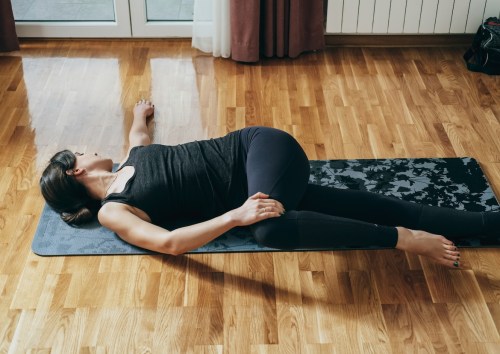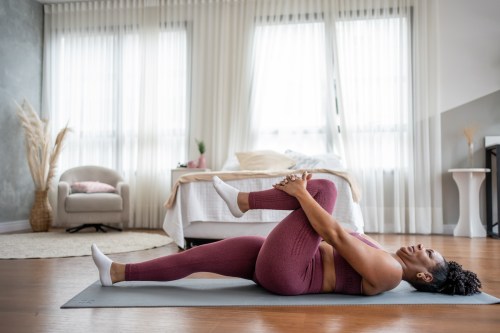A golden rule of fitness is that your recovery days are just as important as your workout days. These much-needed pauses refresh your muscle tissue and stave off injury. But if you find that your days of R&R are leaving you more fatigued than the days you go hard at the gym, trainers say there’s a simple explanation.
Experts in This Article
Chris Layda is a master SoulCycle instructor in Northern California.
Jess Evans is a trainer with FightCamp, an at-home boxing workout.
Here’s the deal: On recovery days, you’re relatively stagnant. (Maybe you’re just doing some light stretching or Netflix-ing big time.) Just because your heart rate’s at rest, however, that doesn’t meant that the rest of your body is also chilling.
“Your body is doing some serious work while at rest,” says Amanda Freeman, founder of SLT and Stretch*d. “This is literally the time when your muscle tissue heals and rebuilds from your workout. It’s during this time of rest/repair when your body becomes stronger so that it can handle more strain—heavier weights, longer runs, faster intervals, etcetera.” In other words, your body’s hard at work making sure that tomorrow’s workout is awesome.
In order for you to fully recover from tough bouts of effort, your system needs to replenish two things: carbohydrates and fluids. Studies indicate that your body needs about 24 hours to restock its carbohydrate stores and at least a few hours to reabsorb the fluids it needs. That’s a pretty quick turnaround time, right?
Our body’s tissues, however, take a little longer: Studies indicate that we need several weeks of cycling through active and restful periods for them to full recover (and achieve those gains Freeman talked about above). When you take a day off, your body doesn’t have to funnel energy into your workout, so it goes all in on repairing your muscles. This may take a toll on your energy levels.
Also, if you’re a morning workout person, FightCamp trainer Jess Evans points out that sleeping in when you don’t have to wake up for that 6:30 a.m. workout may be adding to your feelings of fatigue. “You might be on a different schedule which can involve sleeping in, and that can make you more tired. I would recommend sticking as close to a schedule as possible to help with that mind and body fatigue, and getting out in nature or taking a short walk to help refresh your mind,” she says. Nabbing an extra dose of sunlight will help your circadian rhythm.
Of course, it’s also possible your rest day activities are draining you of your energy. Maybe you’re meal prepping for the week ahead, or watching an entire season of Stranger Things—and you find that these activities (while great) are causing your eyelids to droop. If this is the case, you can opt for energizing, yet still restful, active recovery options like heading out for an easy hike, foam rolling, or going for a low-key swim.
Overall, trainers say it’s well worth figuring out how to enjoy your rest days because they are absolutely crucial—not only to your physical well-being, but also to your mental health.
“Rest days are not just important, they are essential. Sometimes newer athletes struggle with this concept, but time devoted to rest and recovery is just as crucial as the time we allocate toward our fitness goals. The body and mind need time to repair from the strain of exercise,” says SoulCycle master instructor Chris Layda. So find a way to love ’em, fam—they’re the key to making sure you get to work out for many years to come.
Oh hi! You look like someone who loves free workouts, discounts for cutting-edge wellness brands, and exclusive Well+Good content. Sign up for Well+, our online community of wellness insiders, and unlock your rewards instantly.
Sign Up for Our Daily Newsletter
Get all the latest in wellness, trends, food, fitness, beauty, and more delivered right to your inbox.
Got it, you've been added to our email list.











